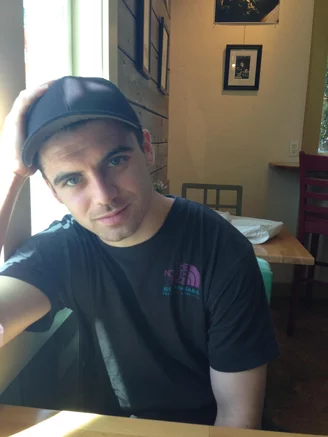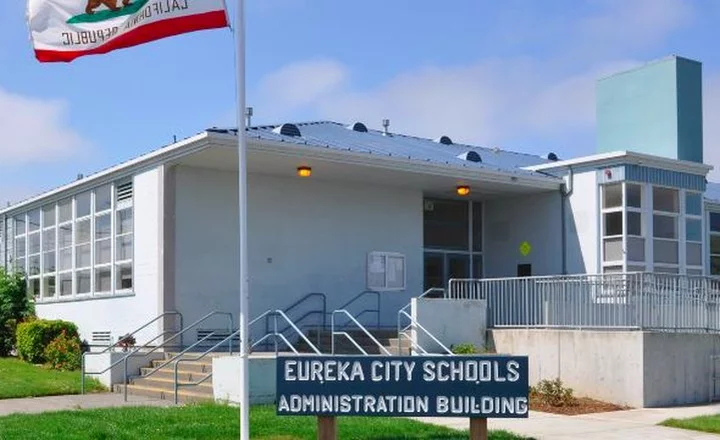PRESCRIBED BURN ROUNDUP: Big, Good Fires Planned Today and Tomorrow in the Blue Lake and Scotia Areas, Respectively, Weather Permitting
Hank Sims / Friday, Oct. 25, 2024 @ 10:27 a.m. / Fire
Prescribed burn near Orleans a few years ago. Photo: Andrew Goff.
We’re doing a lot more prescribed fires now then we did 10 years ago, and that’s a good thing. The idea is that you burn up some understory to avoid the chances of a big, out-of-control fire in the coming years. Local Native American people did this for time immemorial, ages ago, and we’re all coming around to the idea that they knew what they were doing.
The damp season is here, which means it’s a decent time to do this work. We’ve received word of a couple of large-ish burns planned today and tomorrow, with the understanding that these things can change with weather conditions.
First up: Planned for today about one mile northeast of Blue Lake, a 50-acre Calfire controlled blaze that should be visible for quite a ways in all directions.
Calfire says:
The project is designed to use prescribed fire to enhance browse for grazing, prairie maintenance, and to reduce fuel loading. The objective is to support grazing and reduce the invasion of brush and conifers on the site.
Tomorrow, the Humboldt Redwood Company plans to do something similar with 25 acres just outside Scotia. It says:
Humboldt Redwood Company will be conducting a broadcast burn within a logging unit on Saturday, 10/25/2024. The burn will be approximately 25 acres and located 4.5 miles Southeast of Scotia. Smoke will be visible from Highway 101 and the surrounding communities, fire will be visible from Pepperwood, Shively, Homes, and various locations along the Eel River. CAL FIE and local fire districts have been notified of this broadcast burn.
Don’t be too alarmed if you see smoke columns in those areas in the coming days. Also, Calfire would like to remind you that though their professional burners are conducting these projects now, amateur burning is still prohibited in their area of responsibility:
As a reminder, outdoor burning remains suspended in State Responsibility Area (SRA). Debris (pile) burning has historically been one of the leading causes of vegetation fires in the Humboldt – Del Norte Unit. These escaped debris fires result when those responsible fail to follow the terms of their permit. Escaped debris burning in the Humboldt – Del Norte Unit is almost always found to be a result of: no clearance, no adult remaining in attendance, burning when windy, or a combination of these factors. Those factors are all violations of a CAL FIRE burn permit. While many members of the public do burn responsibly and within the terms of their permits, the risks caused by those who burn negligently requires the extension of the duration of the burn suspension. Prescribed fires though can be conducted safely. These projects are conducted after inspection and consideration of factors such as: weather, resource availability, and statewide fire activity. Prescribed fires are conducted by experienced personnel with multiple resources available at scene to minimize associated risks.
That’s all the fire news for today. Good luck, good fire professionals!
BOOKED
Yesterday: 8 felonies, 13 misdemeanors, 0 infractions
JUDGED
Humboldt County Superior Court Calendar: Yesterday
CHP REPORTS
Meyers Ave / Pine Hill Rd (HM office): Traffic Hazard
Mm101 N Hum 114.50 (HM office): Traffic Hazard
10800 Mm101 S Hum 108.00 (HM office): Traffic Hazard
11100 Mm101 N Hum 111.00 (HM office): Traffic Hazard
ELSEWHERE
Times-Standard : Civic calendar | Blue Lake to discuss water, sewer rate increases
RHBB: Juan Heredia Assists in Ongoing Eel River Search for Missing Covelo Woman
RHBB: Cal Poly Humboldt Responds After Yesterday’s Occupation of Siemens Hall by Protestors
RHBB: California Reports Continuing Decline in Sexually Transmitted Infections
California’s Plan to Overhaul a Key Climate Program — Raising the Cost of Gas — Ignites Debate
Alejandro Lazo / Friday, Oct. 25, 2024 @ 7:39 a.m. / Sacramento
A Chevron gas station in Fresno on June 23, 2022. Photo by Larry Valenzuela, CalMatters/CatchLight Local
California plans to overhaul one of its cornerstone climate programs — a decision that could push gasoline prices higher in a state where residents already pay the most at the pump.
On Nov. 8, just three days after an election marked by concerns over rising costs, the California Air Resources Board will hold a public hearing and vote on its plan to amend the Low Carbon Fuel Standard.
The program, which has existed since 2011, is a $2-billion credit trading system that requires fuels sold in California to become progressively cleaner, while giving companies financial incentives to produce less-polluting fuels, such as biofuels made from soybeans or cow manure. The standard has helped the state phase out fossil fuels to clean up air pollution and cut climate-warming gases.
The concern over gas prices has been part of the debate since last December, when the plan was released. Much of the agency’s overhaul, however, has focused on highly technical disputes between oil companies, dairy farms, biofuel and other lower-carbon fuel companies, and environmental justice advocates who say the program maintains polluting industries.
But as the election has approached — with costs and affordability of top concern for voters — Republicans in California’s state Legislature have urged a delay in the fuel standard changes, saying they could further drive up gasoline prices. They also have criticized Gov. Gavin Newsom, who recently declared victory over Big Oil during a special legislative session, for not doing enough to cut gas prices. On Thursday, California’s House Republicans also urged a delay in the air board plan.
The proposal to strengthen the fuel standard has fueled a recent outcry from the public: More than 100 commenters earlier this month wrote to the air board, protesting the amendments due to the potential impact on gas and diesel prices.
“Are you kidding?” Rich Marotti of Ventura County wrote, adding a profane adjective. “Gas is already more expensive in CA than HI. That’s absurd…Any action taken to increase gas prices is an attack on California citizens.”
The gas price revolt over the fuel standard underscores how the state’s ambitious agenda for addressing climate change can come under fire if it threatens to make fossil fuels more expensive as the state tries to phase them out by 2045. Californians paid an average of $4.61 a gallon on Thursday.
Energy experts and air board staff say the fuel standard raises the cost of producing high-polluting gasoline and diesel for the California market. Those costs can drive up prices at the pump when companies pass them on to their customers, although it’s difficult to predict exactly by how much.
“Gas is already more expensive in CA than HI. That’s absurd…Any action taken to increase gas prices is an attack on California citizens.
— Rich Marotti, a Ventura County resident
The air board said earlier this month that fuel producers typically pass on 8 to 10 cents per gallon of costs to consumers because of the program. Estimates for how the air board’s proposed changes in the program would affect gasoline prices vary.
In an initial assessment released last year, the air board projected that the proposed new standard could potentially raise the per-gallon price of diesel by 59 cents and for gasoline, 47 cents, in 2025 — numbers that have turned the policy debate into a political flashpoint.
Air board officials have since disavowed that estimate, writing earlier this month that the analysis “should not be misconstrued as a prediction of the future credit price nor as a direct impact on prices at the pump.”
A separate report, released earlier this month by the University of Pennsylvania’s Kleinman Center for Energy Policy, predicted that the program’s changes could increase the cost of gas by 85 cents a gallon through 2030.
Air Resources Board Chair Liane Randolph told CalMatters in an exclusive interview that the heated debate prompted her to speak out ahead of the board’s vote, something she typically doesn’t do.
In the interview, Randolph emphasized that the fuel standard is critical for meeting the state’s targets to slash greenhouse gases and use of fossil fuels. She said the proposed changes are designed to prevent California from falling behind on its ambitious climate goals, which are already at risk, according to experts.
At the heart of the debate, Randolph said, is a fundamental question about California’s climate future: How quickly can we shift from fossil fuels to a zero-emission future?
The air board’s changes could reduce carbon dioxide-equivalent gases by 558 million metric tons through 2046, according to its initial economic assessment. That’s equal to what more than 120 million cars emit on average in a year. (Experts say that may be an overstatement because the carbon footprint from some renewable diesel such as soybeans might be more than reported.)
“The Low Carbon Fuel Standard is one of California’s most significant and most effective climate programs,” Randolph told CalMatters. “It’s a market program that comes with a mandate to fuel producers to reduce their carbon intensity over time. So the reason we undertook the update of this program is because we wanted to make sure that the ambition of the program was aligned with our goals.”
Randolph said the fuel standard has been a crucial driver in reducing pollution from cars and trucks, and can help drive a wider array of transportation choices for Californians. The program, she added, “helps clean the air in the most impacted areas.”
“For the everyday Californian…this helps fund your opportunity to buy a plug-in hybrid car, a battery electric car, a hydrogen fuel cell car,” Randolph said. And for diesel trucks and delivery vans, it “is helping make those vehicles cleaner and quieter.”
The program has been particularly successful in shifting the fuel market for medium and heavy-duty trucks, and over the course of 13 years, the program has displaced 25 billion gallons of petroleum fuels, according to the board’s economic assessment.
Regarding the cost at the gas pump, Randolph said it’s challenging to put a specific number on gas prices because fuel producers have different strategies for complying. Some might produce cleaner fuels themselves, potentially profiting from the incentives, while others may buy credits on the market, which could lead to varying costs.
It’s hard to predict whether oil companies will pass those costs onto customers or absorb them, making it difficult to determine the exact impact on prices, Randolph said. She pointed to the data indicating that fuel producers typically pass on 8 to 10 cents per gallon costs to consumers because of the program.
The fuel standard “is one of California’s most significant and most effective climate programs. It’s a market program that comes with a mandate to fuel producers to reduce their carbon intensity over time.”
— Air Board Chair Liane Randolph
The current standard’s target is reducing the climate impact of transportation fuels by 20% between 2010 and 2030. The air board proposal would impose tougher “carbon intensity” targets, tightening reductions in the greenhouse gases those fuels produce by about 30% by 2030 and 90% by 2045. (Carbon intensity is the measure of carbon dioxide emissions produced per unit of energy or activity.) The board is also considering accelerating those reductions when certain conditions are met.
This tightening of the standard will affect the entire fuel market, from companies such as Chevron and Shell that dominate fuel production in California to smaller operators who import fuel.
The Western States Petroleum Association, an oil industry group, has supported the low-carbon fuels program, with many of its members producing some of the new fuels the program has spurred. However, they have argued against many of the proposed changes because they might increase costs or disadvantage some companies.
Chevron has warned against what the changes might do to costs in the state.
“At a time when fuel prices are under significant scrutiny and demand in California frequently outstrips supply, regulators should be careful about adding new measures that restrict supply,” Don Gilstrap, the company’s manager of fuels regulations wrote earlier this month.
Laura Renger, executive director of the California Electric Transportation Coalition, said the fuel standard is essential for getting more electric cars on the road and building the charging infrastructure they need.
The program has funneled billions into electric vehicles and chargers, pushing the state away from petroleum and toward cleaner electricity. With the new rules under consideration, she says, the state’s utilities will have funds to invest even more.
Through the fuel standard, California has become a proving ground for cleaner fuels.
The tighter the fuel standard, the more intense the scramble to produce lower-carbon alternatives and obtain credits. The program considers not just tailpipe emissions but also carbon emitted during fuel production and distribution.
So many companies have produced cleaner fuels that the price of credits has nosedived, dropping to an average of $62.17 in mid-October compared to $180.86 the same week three years ago. The credits have built up to the point where some companies can simply buy their way out of producing cleaner fuels.
To avoid that, regulators have proposed the changes to be voted on next month — essentially tightening the standard so that companies are incentivized to burn through the excess credits.
Biofuels: Are they better?
Most notably, the fuel standard has spurred a boom in biofuels, which are produced from plants or animal waste. Two Bay Area companies are converting their refineries to focus on biofuels: a Marathon joint venture with the company Neste at the Marathon Martinez refinery and a conversion by Phillips 66 of one of its refineries in Rodeo to a biofuels project.
But experts have increasingly questioned that approach, particularly if the state is trying to shift transportation from fuels that are burned to zero-emission vehicles. The University of Pennsylvania report, authored by Danny Cullenward, a climate economist, estimates that about 80% of the credits issued to date — worth more than $17.7 billion, have gone to biofuels.
While biofuels reduce emissions relative to traditional fossil fuels, he says that their production, particularly renewable diesel fuels, like soybean, has unintended environmental consequences, including deforestation and food system disruptions. The board has proposed caps on diesel produced from soybean oil, canola oil and sunflower oil, but some groups say that the proposed measures don’t go far enough.
A debate over fuel from cow manure
Throughout the debate, tensions have arisen over how the new fuels have impacted California’s polluted, low-income communities of color. One of the most heated disputes has been over the proposed phaseout of climate credits for cow poop — biofuel made from dairy farm manure.

The digester system on the Legacy Ranches near Pixley. Several farms house digester systems that feed methane gas to a facility that produces renewable natural gas. Photo by Larry Valenzuela, CalMatters/CatchLight Local
California’s strategy for cutting its methane footprint has so far hinged on providing incentives, mostly to the dairy industry, through grants for construction of digesters — recovery systems that trap the methane from manure — and valuable climate credits from the fuel standard program for the natural gas that methane produces.
About half of the state’s methane emissions come from dairy and livestock, so collecting the gases wafting off of manure keeps them out of the atmosphere and offers a renewable source of fuel.
But the board has proposed a phase out of those credits, beginning in 30 years for projects that already exist and 20 years for those built before 2030. The proposal has angered environmental groups who want a more aggressive discontinuation because they say the credits support industrial dairy farms that pollute rural, low-income communities in the Central Valley.
The state’s dairy industry, meanwhile, says the credits are one of the program’s success stories.
“As a result of this important program, dairy farmers are able to reduce emissions and enhance the environment and economic stability of their farms,” wrote Michael Boccadoro, head of Dairy Cares, which promotes digesters for methane reduction.
And finally, a major debate has been waged about what the program isn’t regulating. The air board considered ending an exemption for jet fuel under the program, but under pressure from the aviation industry, declined to pursue it in its final proposal.
###
CalMatters.org is a nonprofit, nonpartisan media venture explaining California policies and politics.
OBITUARY: Riley Kai Clark-Walkner, 1995-2024
LoCO Staff / Friday, Oct. 25, 2024 @ 6:56 a.m. / Obits
Riley Kai Clark-Walkner, age 28, was born on November 11, 1995, in
Arcata to Jessica “Jessie”
Burns and Joshua Clark. After a long battle with addiction, he died
on September 28, 2024,
in San Francisco.
Riley was a precocious and curious young toddler who was running around at 10 months of age and speaking multiple-word sentences at just over a year old. He was extremely active and was obsessed with building intricate Lego creations, an activity he shared with his siblings for many years.
Riley received his education in local Humboldt schools, where he completed his high school diploma and attended College of the Redwoods. Volunteering at a local church and working as a general laborer and custodian, Riley worked in many positions throughout Humboldt and Trinity County. Riley was an enthusiastic and hard worker. He often helped his grandmother stacking wood and shoveling snow, as well as any other task involving strength and determination.
A loving big brother to his younger siblings — Adam, Owen, and Scarlett — Riley also maintained close relationships with his godmother, as well as grandparents on both sides of his family. He was known for his infinite creativity and love for life, always envisioning a new plan or idea and consequently never failing to bring excitement to those around him. His genuine nature, off-the-cuff sense of humor, strong work ethic and immense love made him unforgettable.
Through his everyday interactions, Riley touched the hearts of the young and old in all walks of life, from teacher to neighbor to friend. He lived with passion and courage, taking time to connect with nature in the beautiful and limitless outdoors.
In this way, Riley’s heart and boundless spirit live on not only in the memories of all who knew him, but in the earth itself — in the roar of the ocean, the gentle redwood mist, the warmth of the mountain sun — his energy all-encompassing.
Riley is survived by his mother, Jessie Burns; his father, Joshua Clark; his siblings, Adam Walkner, Owen Burns, and Scarlett Burns; son, Wiley Clark; stepfather, Joseph Burns; his godmother, Ranee Kletchka; grandparents, Judy Walkner, Mike and Carolyn Walkner, Pamela Foster, Dan and Joanne Clark; great grandmother, Joyce Craig; nephew, Alexander “Ronnie” Walkner; aunts and uncles; Casey and Laura Walkner, Mica Clark and Mari Persson, Cicely Ames and Jaimal Kordes, Guy and Ashley Walkner, and Isaac Clark; cousins, Wylie and Coyle Walkner, Noah Clark, James Holbrooks, Darrell Holbrooks, and Bella Crawford; and great-nieces; Tatum, Baylee, and Callie Walkner. He is preceded in death by his proud paternal great-grandfather, Richard “Papa Frostie” Foster; paternal grandfather, Jack Jones; and paternal aunt, Arlo Christiansen.
Riley‘s family would like to express the sincerest gratitude to the many kind people who supported him in his journey. Special love and appreciation to Darby Rose Madrone for friendship, connection, and support throughout Riley’s life, particularly in his later years.
A celebration of life for Riley will be held on his birthday, November 11, 2024, at Samoa Beach at 11:11 a.m. All are welcome. We love you, Ri. Your beautiful spirit can now fly free from earthly constraints. We are blessed to have had you touch our lives on so many levels and in so many ways.
If you or someone you know is battling mental health and/or substance abuse issues, please contact:
SAMHSA’s NationalHelpline | SAMHSA
SAMHSA’s National Helpline is a free, confidential, 24/7, 365-day-a-year treatment referral and information service (in English and Spanish) for individuals and families facing mental and/or substance use disorders.
1-800-662-HELP (4357)
###
The obituary above was submitted on behalf of Riley Clark-Walkner’s loved ones. The Lost Coast Outpost runs obituaries of Humboldt County residents at no charge. See guidelines here. Email news@lostcoastoutpost.com.
OBITUARY: Gerald Lee Carter, 1942-2024
LoCO Staff / Friday, Oct. 25, 2024 @ 6:56 a.m. / Obits
Gerald “Jerry” Carter passed away on October 4, 2024 at Providence St.
Joseph Hospital after a long battle with congestive heart failure.
Jerry was born on July 23, 1942 to Robert and Grace Carter in Shafter, California. He grew up with two brothers and a twin sister, and while his family moved around a lot, they stayed in Kern County and eventually settled in Tehachapi. After graduating from high school, Jerry moved to Humboldt County to attend Humboldt State University. While traveling to and from home via Greyhound buses, he met his future wife Ardith Meadows, another student at HSU, who was making similar trips to and from Glendale, California. It was love at first sight, and the two were married in Glendale on February 3, 1963.
The happy couple stayed in Humboldt County and started a family right away, giving birth to Karyn in 1964, Kathryn in 1966, and Steven in 1969. During this time, they also worked for Eureka City Schools. Jerry started out teaching typing at Eureka High School — not because he knew anything about the subject, but because he needed the job — and later transitioned to business education, which was more up his alley. After that, Jerry became an administrator for ECS, working for Eureka High School and Zoe Barnum, and helped guide ECS into the early years of the internet.
Jerry retired in 1996 and began focusing more on public service, especially after Ardith died of cancer in 2006. In 2010 he joined the Eureka Host Lions Club, eventually becoming its president, and he also assisted other non-profit organizations such as the Humboldt Grange (where one year he grew a beard so he could play Santa Claus for their Santa’s Workshop program) and the Salvation Army (where he regularly helped with their pancake breakfasts). Jerry even donated blood, surpassing the 13 gallon mark at the Eureka Blood Bank.
Jerry attended church every Sunday, starting at the First Christian Church and then moving to the United Congregational Christian Church (when the First Christian Church and the Congregational Church merged together). Jerry was a deacon for many years, and he contributed dozens upon dozens of cookies, cakes and dessert breads to church fundraisers and events. Jerry always enjoyed sitting with his friends and listening to Pastor Cindi Knox’s sermons.
Jerry loved talking to people. He made friends everywhere, he was always available to help or give advice, and he was genuinely interested in where people came from and what they wanted to do with their life. He also loved to tell people about growing up in Kern County, and how life was different in the ‘40s, including how the hospital bill for his birth came to $57.50, but only because his mother had twins and had to stay in the hospital for three weeks.
Jerry had numerous hobbies, including cooking, working with model trains, making puzzles, and rooting for the Dodgers — much to the chagrin of his many Giants-fan friends. He was always trying out new recipes, especially for cookies, and he kept tinkering with ideas for how to put a garden railway in his backyard, although sadly it never came to pass. He also spent a lot of time with his pet dog Bridget. He always made sure to bring her home a doggie bag when he went out to eat, and she in turn followed him around everywhere, until he finally went somewhere she couldn’t go.
Jerry was preceded in death by his parents Robert and Grace, his wife Ardith, his younger brother Bob, and his twin sister Cheryl, but he is survived by his older brother Ken and his three children: Karyn, Kathryn and Steven.
Arrangements are under the care of the Sanders Funeral Home in Eureka. A memorial service will be held on November 9 at 2 p.m. at the United Congregational Christian Church, 900 Hodgson Street, Eureka.
Contributions in lieu of flowers can be made to the United Congregational Christian Church, the Lions Club, or the worthy charity of your choice.
###
The obituary above was submitted on behalf of Gerald Carter’s loved ones. The Lost Coast Outpost runs obituaries of Humboldt County residents at no charge. See guidelines here. Email news@lostcoastoutpost.com.
To Atone for its Extensive Air Travel, Cal Poly Humboldt’s Administration Will Buy ‘Carbon Offsets’ From the City of Arcata’s Community Forest
LoCO Staff / Thursday, Oct. 24, 2024 @ 1:15 p.m. / Environment
A passing airplane provides the Arcata Community Forest with an ample supply of carbon dioxide. Photo: Cal Poly Humboldt.
Press release from Cal Poly Humboldt:
In line with Cal Poly Humboldt’s Climate Action Plan 2.0’s goal of carbon neutrality by 2045, the University will purchase carbon offsets at the Arcata Community Forest. The purchase will help compensate for the carbon emissions generated by University-financed air travel.
“We don’t want to restrict air travel; we value the collaboration, communications, experiences, and relationship building that air travel affords to our campus community. But we also need to lower our emissions, so purchasing carbon offsets is a great way to neutralize the University’s air travel emissions,” says Morgan King, Cal Poly Humboldt’s climate action analyst.
Carbon offsets are certificates representing the removal of one metric ton of carbon dioxide emission (CO2e). Carbon offsets on the voluntary market are available for purchase by individuals, institutions, and businesses to offset carbon emissions from travel and daily activities. Essentially, carbon offsets fund projects that reduce greenhouse gas emissions, like forest conservation projects or improved forest management.
The University will partner with the city of Arcata to purchase verified carbon offsets from the Arcata Community Forest using rebate funding.
“The city of Arcata is pleased to continue our partnership with Cal Poly Humboldt on local sustainability programs. The purchase of carbon offset credits through the City’s verified forest carbon program will help compensate for greenhouse gas emissions resulting from travel for university business. The purchase of carbon offsets supports the Arcata Community Forest to continue growing large, old trees and sequestering carbon for the next 100 years,” says Arcata’s Environmental Services Director Emily Sinkhorn.
The city of Arcata oversees multiple programs and projects that actively sequester carbon including:
- The Arcata Community Forest emphasizes carbon sequestration by growing trees on extended rotations, designating reserves, and adding forest acres that could otherwise be developed
- The Riparian Forest Establishment, which established more than 100 acres of new riparian forest along creeks and bottomlands
- The Salt Marsh Project at McDaniel Slough Marsh Restoration Project, which sequesters additional carbon on its 240-acre site, creating a case study that will be used to help develop sequestration protocols for salt marsh restoration activities
- The Urban Forestry Project is an active program to expand the planting of trees in the urban landscape including parks, roadside greenways, and the downtown area.
As an example, in 2023-24, the University’s air travel contributed to about 2.5% of the campus’s carbon footprint or 316.45 metric tons of carbon dioxide equivalent. To help offset this impact, the University could have purchased carbon offsets from the city of Arcata. Each carbon offset from the Arcata Community Forest represents removing one metric ton of CO2e and may cost $30, although the cost may fluctuate depending on the market and other factors, so it would have cost the University, $9,494 to neutralize last year’s air travel. This offset equaled 316.45 metric tons of CO2e, the equivalent of 809,342 miles driven by an average gasoline-powered passenger car.
The University will make its first purchase of carbon offsets from the city of Arcata next July, neutralizing its air-travel carbon footprint for the 2024-25 fiscal year.
In 2023, Cal Poly Humboldt introduced its Climate Action Plan 2.0, a roadmap to achieve carbon neutrality by 2045, featuring 35 strategies to reduce fossil fuel consumption and enhance climate resilience, including the purchase of offsets. The carbon offset not only aids in reducing the University’s carbon footprint but also brings benefits to a local partner and the campus community. The Arcata Community Forest, which spans 2,350 acres and borders the Cal Poly Humboldt campus, plays a vital role in providing education, research, and recreational opportunities to the campus community.
This sustainably managed redwood forest sequesters carbon, provides various ecosystem services that enhance the climate resilience of the campus and community and has undergone third-party verification to be included in the Climate Action Reserve carbon credit registry.
“Buying carbon offsets from the city of Arcata presents an incredible opportunity for the University to slash carbon emissions while also backing a valuable local resource,” King says.
Eureka City Schools Board of Trustees Appoints Cynthia Bones to Vacant Board Seat; Jacobs Campus Negotiations to Continue at Tonight’s Meeting
Isabella Vanderheiden / Thursday, Oct. 24, 2024 @ 12:32 p.m. / Education , Local Government
Eureka City Schools administration building. | Photo via ECS.
###
At a special meeting on Tuesday, the Eureka City Schools (ECS) District Board of Trustees unanimously voted to appoint Cynthia Bones, a senior planner with the Yurok Tribe, to represent Trustee Area 2 on the school board. The seat was previously held by former ECS Board President Mike Duncan, who vacated the position for unknown reasons sometime last month.
Four other applicants applied for the vacant seat, including Thavisak “Lucky” Syphanthong, who is also running for a seat on the Eureka City Council.
Bones has three children attending schools within the district and has volunteered as a parent representative on the school district’s Indian Education Parent Advisory Committee (PAC) and Lafayette Elementary’s School Site Council. She has also served on the Yurok Tribe’s election board and enrollment committee.
“In the past committees I have sat on my first question is how does this help the majority of our students. I would like to continue this on a larger scale,” Bones wrote in her application for the Trustee Area 2 position. “I would like to be on the board so that I can help be an advocate for all children.”
The ECS Board of Trustees has been subject to intense scrutiny in the ten months since its five members unanimously approved a land exchange agreement with “AMG Communities - Jacobs, LLC,” a mysterious private developer who promised nearly $6 million for the long-blighted Jacobs Campus. The controversial decision put an abrupt end to years-long property negotiations between the school district and the California Highway Patrol, which had hoped to build its new headquarters on the site. In August, the board unanimously agreed to back out of the deal with AMG Communities- Jacobs following multiple delays in closing escrow.
In her application, Bones underscored the importance of public participation and transparency in decision-making, noting that the Board of Trustees should do more to ensure constituents understand the process. “I believe there should be an open door policy with the board,” she wrote. “The board should be able to hear concerns and work with the community to navigate the proper procedures to follow up on their concerns.”
Bones’ appointment to the Board of Trustees was approved in a 4-0 vote. Her four-year term will officially begin once she takes the oath of office at an organizational meeting on Dec. 12.
###
The ECS Board of Trustees will convene for its regular meeting tonight at 6:30 p.m. at the Board of Education for Eureka City Schools – 2100 J Street in Eureka. The board will meet in closed session with CHP’s negotiating team to discuss the sale of the Jacobs Campus. There’s no telling when the board will make a decision.
Tonight’s agenda can be found at this link.
How Inflation Concerns Could Doom California’s Proposition to Increase Minimum Wage
Jeanne Kuang / Thursday, Oct. 24, 2024 @ 7:26 a.m. / Sacramento
Mirna Hernandez shops at Superior Groceries in Victorville on Aug. 16, 2024. Photo by Ted Soqui for CalMatters
A year ago, a ballot measure to raise the statewide minimum wage to $18 seemed poised for an easy win in California, where costs have skyrocketed, affordability is a key concern and many of the state’s biggest cities already require businesses to pay close to that much.
But weeks before California decides on a measure that would do that, voter support appears to have fallen significantly amid heightened concerns about the economy that opponents are stressing, and a relatively quiet campaign in favor of Proposition 32.
A poll released Wednesday night by the Public Policy Institute of California shows just 44% of likely voters backing the measure, which would raise the minimum wage in January from the scheduled $16.50 to $18, with a delay for small employers. That’s a decline from 50% of those polled in September, and more than two-thirds surveyed last November who said they supported raising the minimum wage until it reaches $18.
The change in voter sentiment could reflect broader concerns about the state’s economy and the jump in costs for housing and food that hammered households over the past three years.
Despite signs of a resilient economy that continues to add jobs and falling inflation, Americans continue to remember lower prices from before the pandemic, and have consistently reported feeling pessimistic about the economy this year in a mismatch experts have dubbed a “vibecession.”
Californians are no different: In the new poll, the economy is by far the issue that respondents said is the most important facing the state, with a solid majority of likely voters saying they expect bad economic times in the next year.
Business groups opposed to raising the minimum wage, which include the California Chamber of Commerce, restaurant and grocers’ groups, and the agricultural industry, are seizing on the concerns. A digital ad released by opponents this week shows a shopper at a grocery store saying the measure would cause prices to increase, while another says she “can’t take it anymore.”
The National Federation of Independent Business, another opponent of minimum wage hikes, also is running radio ads saying the measure would worsen inflation, “hurt small businesses and harm their ability to grow and add jobs.” In response to questions about inflation falling, spokesperson Anthony Malandra said the group’s members still list inflation as a top concern.
Proponents of the wage hike dismissed the ads’ claims, but acknowledged it’s a powerful message this election year. The pro-Prop. 32 campaign, said spokesperson Angelo Greco, is also running digital ads and sending text blasts to turn out voters in big cities that are more likely to reliably support the measure.
Proponents say the measure could give raises to about two million California workers, at a time when costs are so high even single Californians with no children need to earn at least $27 an hour to be self-sufficient, according to researchers at MIT.
“While it’s the same argument that we have always heard (from businesses) the last 20 years, it resonates more when people have seen the cost of goods and services go up,” said Jane Kim, state director for the Working Families Party, a progressive group supporting the ballot measure. “That’s the softening in support that you’re seeing. We are concerned, and that’s why we are reaching out to voters that we think naturally will support an increase to the minimum wage.”
Proponents pointed to recent studies showing the state’s $20 fast-food minimum wage, which began in April, had little effect on employment in that industry, and only raised menu prices by about 3.7%.
California did have slower growth than the nation this year, but Jerry Nickelsburg, an economist who directs the UCLA Anderson Forecast, said that’s unusual and he’s predicted the state’s economy will again grow faster next year.
The state’s unemployment rate is 5.3%, higher than the nation’s 4.1%. Nickelsburg says that’s only in small part influenced by recent minimum wage hikes. Unemployment in California, he said, is driven mostly by downsizing in tech and entertainment, higher wages and reduced reliance on delivery drivers since the pandemic-era peak of online ordering and two stormy winters that put many farm laborers out of work.
“All of those (factors) will dissipate over time,” he said.
Mark Baldassare, statewide survey director for the Public Policy Institute, said he suspects likely voters who were surveyed are confused by the relative lack of a vocal campaign for the measure.
After pouring $10 million into qualifying the measure for the ballot in 2022, the measure’s author Joe Sanberg, a startup investor and anti-poverty advocate, resisted some labor advocates’ calls to withdraw the measure this year. But he still appeared to take a step back from formal campaigning, telling CalMatters in August that the message of workers needing higher pay to afford living in California would sell itself naturally.
He closed the proposition’s campaign account earlier this year. Aside from money in a campaign account tied to Los Angeles City Councilmember Kevin de León, who supports the proposition along with two other measures, the measure hardly raised any funds this year until Sanberg donated about $100,000 this week. (Groups opposing the measure have raised more than $700,000 this year.)
The ballot, which for the first time this year lists supporters and opponents of propositions, does not include the name of any organizations pushing for Prop. 32. The state Chamber of Commerce, Restaurant Association and Grocers Association are listed as opponents.
“Here’s the thing about ballot propositions and initiatives in particular: People are cautious about voting ‘yes’ on them,” Baldassare said. “If it’s on the ballot, the question is, why? Who put it there? Who’s supporting it?”
A spokesperson for the Secretary of State’s office told CalMatters that Sanberg declined to list himself or another group as the supporters. Sanberg did not respond to a request for comment.
Greco called the campaign “more of a grassroots effort.” But the quiet campaign drew criticism from a statewide union group. In 2016, unions were instrumental in muscling political support for a series of minimum wage increases that made California the first state in the nation to require $15 an hour.
“We support an increase in the minimum wage,” said Lorena Gonzalez, leader of the California Labor Federation, which endorsed the measure. “We still support Prop. 32. But we’re disappointed there’s been very little activity from the campaign.”
###
CalMatters.org is a nonprofit, nonpartisan media venture explaining California policies and politics.







